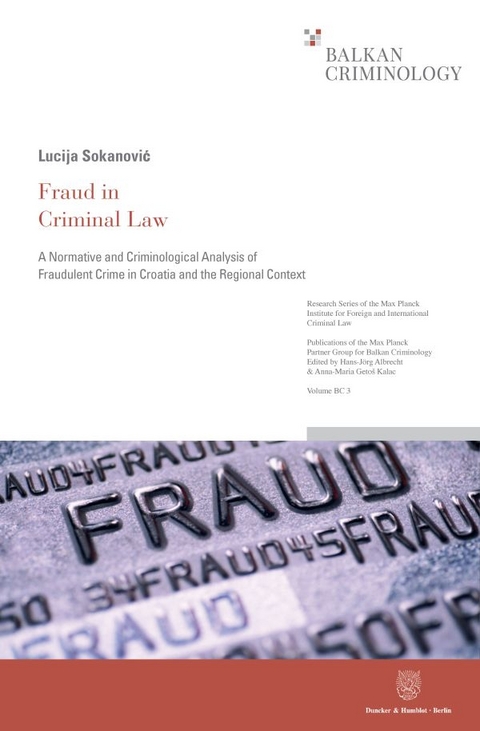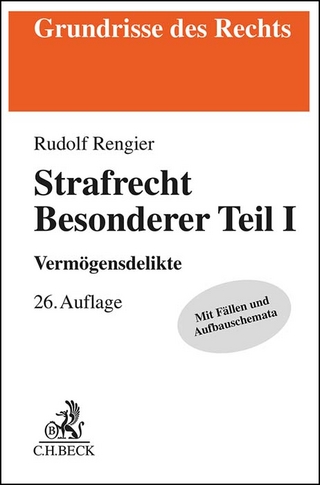
Fraud in Criminal Law.
Duncker & Humblot (Verlag)
978-3-428-15768-6 (ISBN)
New forms of criminal fraud are constantly emerging and their incidence is increasing. This book provides in-depth analyses of whether, and how exactly, criminal law perceives and adapts to these developments.
The main focus of the study are the relevant normative and criminological questions regarding fraud, fraud in economic transactions, subsidy fraud, computer and electoral fraud, and some other forms of fraudulent behaviour. From a comparative perspective, it becomes apparent that a specific group of statutory offences is scattered throughout the criminal codes of Croatia, Germany, Austria and Switzerland and also the neighbouring countries in the Balkan region, all of which fit the same pattern and reveal the same core features of fraud. Criminal law addresses them in the same manner, hence a »fraud-related criminal law« can be identified. This should be of help for developing and applying adequate measures for effective detection and prosecution of this type of offences.
Standardization of legal protection against fraud is reflected upon as an instrument that represents the dynamics of the transition and integration of European countries and the globalization of the economy, with their growing intensity of economic cross-border transactions.
Lucija Sokanovic is an Assistant Professor at the Chair for Criminal Law at the Faculty of Law, University of Split, Croatia. After graduating from the Split Faculty of Law, she worked at the Municipal Court in Kastel Luksic and at the Commercial Court in Split. She passed her bar exam in 2002. In 2014 she received her Ph.D. degree at the Faculty of Law, University of Zagreb (Doctoral Studies in Criminal Sciences), with the dissertation »Fraud in Criminal Law«. She teaches criminal law, commercial criminal law, criminal protection of the environment, international criminal law and sports criminal law. Her list of publications includes authored and co-authored articles in all these fields of expertise. She was visiting Scholar at the Freie Universität, Berlin, and the Max-Planck-Institut für ausländisches und internationales Strafrecht, Freiburg, Germany. She won the Award for best quality teaching 2015/2016 of the University Department of Forensic Sciences and the Award of the Student Choir of the Faculty of Law of the University of Split 2017.
Chapter 1: Introductory Remarks
Chapter 2: Fraud
Historical Development – Criminological-Victimological Significance of Fraud – Objective Features – Subjective Features – The Aggravated Forms of Fraud
Chapter 3: Fraud in Economic Transactions
Historical Development – Criminological and Victimological Significance – Objective Features – Sub-jective Features – Typical Cases of Fraud in Economic Transactions
Chapter 4: Subsidy Fraud
Historical Development – Criminological Significance – Objective Features – Subjective Features – Cooperation of National and International Authorities in the Protection of the Financial Interests of the EU
Chapter 5: Computer Fraud
Historical Development – Criminological Significance – Objective Features – Subjective Features
Chapter 6: Electoral Fraud
Historical Development – Criminological Significance – Objective Features – Subjective Features
Chapter 7: Fraud in Other Criminal Offences
Chapter 8: Implications for the Balkan Region
Bosnia and Herzegovina – Serbia – Slovenia – Montenegro – Hungary
Chapter 9: Discussion and Conclusion on the Various Types of Fraud
References
Annexes
| Erscheinungsdatum | 29.05.2020 |
|---|---|
| Reihe/Serie | Research Series of the Max Planck Institute for Foreign and International Criminal Law. Series BC: Publications of the Max Planck Partner Group for Balkan Criminology ; 3 |
| Zusatzinfo | 21 Tab., 5 farb. Abb.; XVI, 280 S., 5 farb. Abb., 21 schw.-w. Tab. |
| Verlagsort | Berlin |
| Sprache | englisch |
| Maße | 148 x 224 mm |
| Gewicht | 385 g |
| Themenwelt | Recht / Steuern ► Allgemeines / Lexika |
| Recht / Steuern ► Strafrecht ► Besonderes Strafrecht | |
| Schlagworte | Balkan region • Economic transactions • Fraudulent Behaviour |
| ISBN-10 | 3-428-15768-0 / 3428157680 |
| ISBN-13 | 978-3-428-15768-6 / 9783428157686 |
| Zustand | Neuware |
| Haben Sie eine Frage zum Produkt? |
aus dem Bereich


